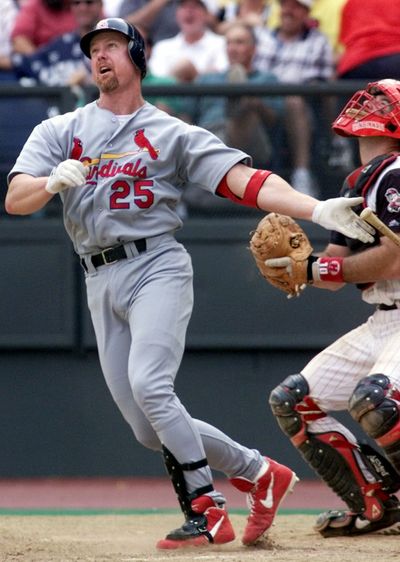McGwire admits he used steroids
He said he did it for health, not for strength reasons

NEW YORK – Sobbing and sniffling, Mark McGwire finally answered the steroid question.
Ending more than a decade of denials and evasion, McGwire admitted Monday what many had suspected for so long – that steroids and human growth hormone helped make him a home run king.
“The toughest thing is my wife, my parents, close friends have had no idea that I hid it from them all this time,” he told the Associated Press in an emotional, 20-minute interview. “I knew this day was going to come. I didn’t know when.”
In a quavering voice, McGwire apologized and said he used steroids and human growth hormone on and off for a decade, starting before the 1990 season and including the year he broke Roger Maris’ single-season home run record in 1998.
“I wish I had never touched steroids,” McGwire said. “It was foolish and it was a mistake.”
He had mostly disappeared since his infamous testimony before a congressional committee in March 2005, when he said, “I’m not here to talk about the past.” He had been in self-imposed exile from public view, an object of ridicule for refusing to answer the questions.
Once he was hired by the Cardinals in October to be their hitting coach, however, he knew he had to say something before the start of spring training in mid-February.
Before a carefully rolled out schedule of statements and interviews, he called commissioner Bud Selig, St. Louis manager Tony La Russa and Maris’ widow, Pat, on Monday to personally break the news and left messages for the current stars of the Cardinals.
“It was a wrong thing what I did. I totally regret it. I just wish I was never in that era,” he said.
McGwire even understands why the Maris family now believes that Maris’ 61 homers in 1961 should be considered the authentic record.
“They have every right to,” McGwire said on the MLB Network.
In his AP interview, McGwire’s voice shook when he recounted breaking the news to his son, Matt, 22. When McGwire hit the record homer, he hoisted Matt – then a 10-year-old batboy – at home plate. He called that conversation the toughest task in the ordeal.
“He’s very, very understandable. So are my parents,” McGwire said. “The biggest thing that they said is they’re very proud of me, that I’m doing this. They all believe it’s for the better. And then I just hope we can move on from this and start my new career as a coach.”
McGwire was a baseball icon – Big Mac, with a Paul Bunyan physique and a home run swing that made fans come out to the ballpark early to watch batting practice. He hit 583 home runs, tied for eighth on the career list, and his average of one every 10.6 at-bats is the best ever.
His record of 70 home runs in 1998 was surpassed by Barry Bonds’ 73 in 2001 – the year of McGwire’s retirement and the apex of the Steroids Era. Bonds has denied knowingly using illegal drugs but has been indicted on charges he made false statements to a federal grand jury and obstructed justice.
In four appearances on the Hall of Fame ballot, McGwire has hovered at 21-24 percent, well below the 75 percent necessary.
“This has nothing to do with the Hall of Fame,” he said. “This has to do with me coming clean, getting it off my chest … ”
Yet he sounded as if all the criticism had wounded the pride he had built as the 1987 A.L. Rookie of the Year and a 12-time All-Star.
“There’s no way a pill or an injection will give you hand-eye coordination or the ability or the great mind that I’ve had as a baseball player,” he said. “I was always the last one to leave. I was always hitting by myself. I took care of myself.”
He said he first used steroids between the 1989 and ‘90 seasons, after the Oakland Athletics’ World Series sweep when he and Jose Canseco formed the Bash Brothers.
“When you work out at gyms, people talk about things like that. It was readily available,” he said. “I tried it for a couple of weeks. I really didn’t think much of it.”
He said he returned to steroids after the 1993 season, when he missed all but 27 games with a mysterious heel injury, after being told steroids might speed his recovery.
“I did this for health purposes. There’s no way I did this for any type of strength purposes,” he said.
“But starting ’93 to ’94, I thought it might help me, you know, where I’d get my body feeling normal, where I wasn’t a walking MASH unit.”
And there was the pressure of living up to his previous performance and his multimillion-dollar salary, McGwire said, adding that he was “getting paid a lot of money to try to stay up to that level.”
McGwire wasn’t sure whether his use of performance-enhancing drugs contributed to some of the injuries that led to his retirement, at age 38, in 2001. “It could have. I don’t know,” he said.
“I’m sure people will wonder if I could have hit all those home runs had I never taken steroids,” McGwire said in his statement. “I had good years when I didn’t take any, and I had bad years when I didn’t take any. I had good years when I took steroids, and I had bad years when I took steroids. But no matter what, I shouldn’t have done it and for that I’m truly sorry.”